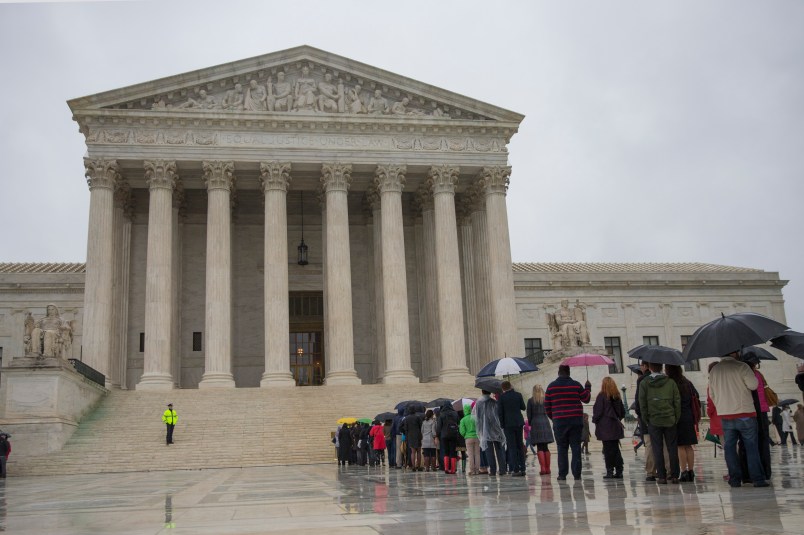The Supreme Court has already delivered major rulings this year on campaign finance and prayer in public meetings. By the end of June, the Court is expected to hand down several more important decisions that could dramatically alter the law and affect Americans’ lives.
Here are key decisions to watch for.
Contraception Mandate
One of the most closely-watched cases this term is about whether the federal government can require for-profit businesses to cover emergency contraceptives for female employees in their health insurance plans at no extra cost. The mandate, authorized by Obamacare, has been challenged by the Christian owners of two companies (Hobby Lobby, an arts and crafts chain, and Conestoga Wood, a cabinet maker) under the 1993 Religious Freedom Restoration Act, which says laws that substantially burden religious liberty must be narrowly tailored to meet a compelling governmental interest.
Outlook: unclear. It doesn’t look particularly good for the White House given that the five Republican-appointed justices expressed deep skepticism of the legality of the contraceptive mandate during oral arguments. Justice Anthony Kennedy, a possible swing vote, expressed a modicum of sympathy for the regulation.
Recess Appointments
A case that could alter the separation of powers raises the question of whether the President may use the Constitution’s recess appointment power to fill government slots while the Senate is technically not on recess but not conducting business (known as pro forma sessions). The Constitution provides that the “President shall have Power to fill up all Vacancies that may happen during the Recess of the Senate.” President Barack Obama has used this power to fill seats on panels like the National Labor Relations Board during pro forma sessions while his nominees were bottled up by Republicans.
Outlook: bad for the White House. Justices liberal and conservative were very skeptical that the president can define pro forma sessions as “recess” when the Senate does not define them so. If the justices agree with an appeals court decision, the power could be curtailed even further.

How We Watch TV
An historic case that carries major implications for the future of television in the United States pits major broadcasters, led by ABC, against Aereo, a startup that lets people stream TV shows on digitally-enabled devices for a monthly subscription fee. The broadcasters say Aereo is violating copyrights law by streaming their programs via tiny antennas without paying them.
Outlook: trouble for Aereo. Justices appeared to agree that Aereo was taking advantage of a kink in the law that didn’t anticipate the advent of new technologies that the startup is utilizing. But the law itself is antiquated so the outcome is less than clear.
Cell Phone Searches
A major privacy rights case this term is about whether police officers need a warrant to search a person’s cellphone upon arresting him or her. Cops typically must have a warrant to search an individual’s possessions but have more latitude to do so with items a person is holding upon arrest.
Outlook: unclear. Justices seemed open to some limits on searches of an individual’s smartphone in minor arrests like traffic stops. But Justice Antonin Scalia, an important vote in many Fourth Amendment cases, expressed sympathy with letting cops search someone’s iPhone in certain situations, like when they have reason to believe doing so may stop a bomb from detonating.

Buffer Zones At Abortion Clinics
The Court will rule on the validity of a Massachusetts law that limits speech within 35 feet of an abortion clinic except for those passing by and employees of the clinic. The aim of the law is to ward off harassment of visitors to the clinic by anti-abortion protesters. It is being challenged by Eleanor McCullen, a woman who argues that it violates her First Amendment right to free speech.
Outlook: grim for Massachusetts. Conservative justices voiced considerable skepticism of the validity of the state’s law as it relates to peaceful or quiet talk. That includes Justice Anthony Kennedy, who is seen as a likely swing vote.







The justices will decide 5 important cases this month or in other words five news ways to screw us all.
Strangely, I think I agree with the conservative justices on the fifth case re abortion protesters. I don’t know how you can prohibit protesting, as long as it’s done peacefully (i.e., just signs and words). yeah, anti-choice idiots are annoying and hateful, but with free speech you have to put up with that. It will be interesting to see how all nine vote on that one.
It’s astonishing how the Reagan and Bush (senior and dumber) appointments have transformed the Court from a respected American institution into a politically motivated instrument in the long term plots of the 1%.
Measure off 35 feet and take a look at it. Massachusetts isn’t prohibiting protesting - it’s prohibiting protesters from getting in your face. If you can’t register your opinion from 36 feet away, you’re doing something wrong.